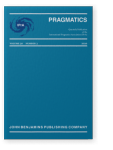Vol. 30:3 (2020) ► pp.381–404
Swearwords reinterpreted
New variants and uses by young Chinese netizens on social media platforms
Swearwords are common on the Internet nowadays. In addition to traditional forms and functions, new features and uses have been created as disguises and hedges, or even as deviants from insults. Focusing on the ‘new swearwords’ prevalent in Chinese social media, we identified the most commonly used novel swearwords developed and favoured by the young Chinese netizens, and analysed their linguistic features and uses on a Chinese social network site. We discovered that certain swearwords have undergone linguistic transformation to take up new grammatical and pragmatic functions. The invention and prevalence of these new swearwords raise interesting points on the roles played by the Internet and social media in bringing netizens together and in enabling them to create web content in their speech community.
Article outline
- 1.Introduction
- 2.Methodology
- 3.Results
- 3.1Categorization of new swearwords
- 3.2Code-mixing in the new swearwords
- 3.3The new grammatical features of the swearwords
- 3.5The new social functions of the swearwords
- 4.The youth, the Internet and beyond
- 5.Conclusion and implications
- Acknowledgements
- Notes
-
References
